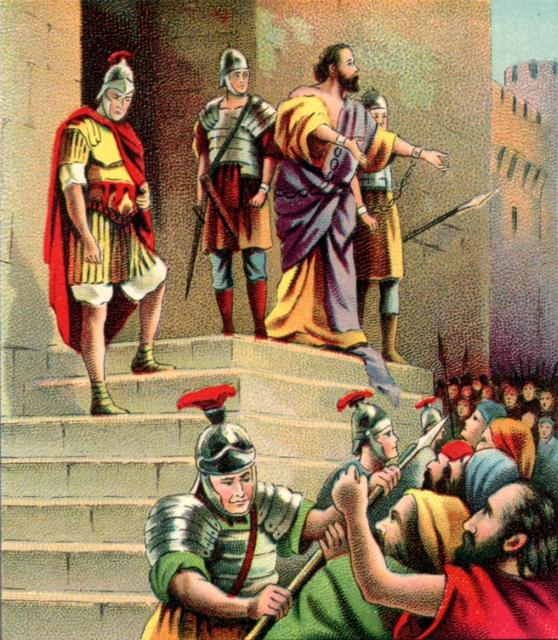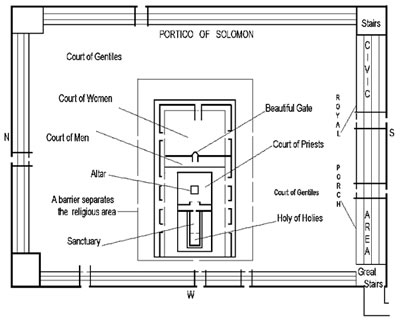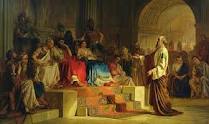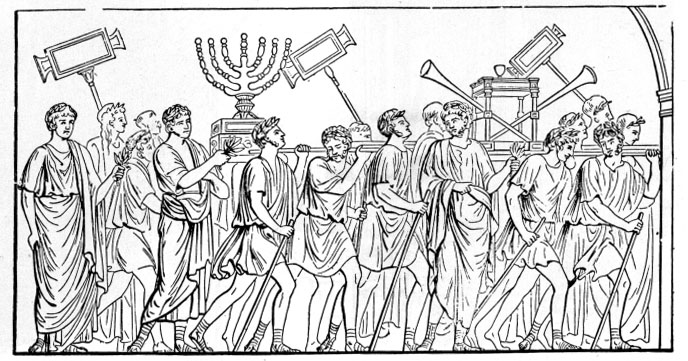|
Search
|
|
Questions?
Click Here to Send Us an Email.
|
|
Recommendations
Only Jesus (great song by Big Daddy) What Did Jesus Say? (2012) - 7 topics None above affiliated with me |
Books:
Paul, a Roman citizen, had been arrested at Jerusalem in 57 AD. He was charged with causing Trophimus, an uncircumcised gentile from Ephesus, to pass the sign-ordinance at the Temple of Jerusalem. This prohibited uncircumcised gentiles to pass beyond; only circumcised Gentiles were permitted in the Temple Court of the Men. As a Roman citizen, Paul was entitled to have a trial before Caesar himself in matters such as this. As Eusebius in 325 AD recorded, Paul was released as a result of his first trial at Rome before Caesar. (Eusebius, The Church History (transl. Paul L. Maier) (Kregel, 1999) 2:22 on page 80.)
There are no records or even historical records of this trial except the outcome of Paul's release. So below we re-enact the likely issues of that first trial with what we believe are likely and plausible details.
59 A.D., a Roman Courtroom
As we look over the courtroom, the audience and defendant were whispering in anticipation of the arrival of Caesar.
Suddenly, trumpets sounded. Horses were heard outside snorting and prancing. It was Caesar. He had studied the case of Paulus. With a great air of authority, Caesar entered the chambers. He grinned at the Prosecutor. Caesar then looked with some disinterest at Paul who was known in Latin as Paulus. Everyone quieted down to hear what Caesar would say. After seating himself, Caesar addressed the prisoner Paul.
Caesar: "Defendant Paulus, please rise. Are you aware of the charge against you, that you conspired with one Trophimus of Ephesus to defile the Temple at Jerusalem?"
Paul: "Yes, I am Caesar."
Caesar: "Defendant, Paulus, how do you plea?"
Paul answered: "Not guilty."
Caesar: "The only factual finding made below by Festus was that 'your book learning has made you mad.' [Acts 26:24.] You appealed to me before Festus reached a verdict on the charge against you. The record indicates you have appealled to me to make a final decision because you are a Roman Citizen [Acts 25:11] and Festus deferred making any final determination. Is this correct?"
Paul: "Indeed Caesar, that was the factual finding of Festus but he rendered no decision on the charge against me. That's why I appealed. I appeal to you Caesar to find me sane as well as innocent."
Caesar: "We will begin by summarizing the underlying charge. It is claimed that you induced Trophimus of Ephesus to enter into a zone prohibited to an uncircumcised person at the Temple of Jerusalem. There is a clearly marked sign that anyone doing so would be punished by death. Your defense to any complicity was that you did not escort Trophimus into the prohibited zone. You were at a ritual bath at the time of his entry. [Acts 21:28-29; 24:18.] To test your story, we have post-poned the execution of Trophimus. He is subject to a death penalty. As a material witness in your case, and because you are a Roman citizen, we preserved his life until now for your benefit. The only question in this case is whether you conspired with Trophimus to commit a sacrilege of the Temple of Jerusalem which the laws of Rome protect against. Do you understand the charge against you?"
of Ephesus to enter into a zone prohibited to an uncircumcised person at the Temple of Jerusalem. There is a clearly marked sign that anyone doing so would be punished by death. Your defense to any complicity was that you did not escort Trophimus into the prohibited zone. You were at a ritual bath at the time of his entry. [Acts 21:28-29; 24:18.] To test your story, we have post-poned the execution of Trophimus. He is subject to a death penalty. As a material witness in your case, and because you are a Roman citizen, we preserved his life until now for your benefit. The only question in this case is whether you conspired with Trophimus to commit a sacrilege of the Temple of Jerusalem which the laws of Rome protect against. Do you understand the charge against you?"
Paul: "I do Caesar?"
Caesar: "Mr. Prosecutor, Claudius Estimus, call your first witness?"
Claudius: "Trophimus, please take the stand."
Trophimus, a young man of 30, climbed into the marble chair on the left side of Caesar. He could turn back and forth in the chair to face Caesar at one moment, and then the prosecutor at another. Legal proceedings in Rome involved many questions posed by the judge (here Caesar) as well as by the prosecutor.
Claudius: "State your name and place of residence."
Trophimus: "Trophimus of Ephesus."
Claudius: "Do you swear to tell the truth by Jove."
Trophimus: "I do by God Almighty."
Caesar: "As you wish."
Claudius: "How did you arrive at Jerusalem on the ides of Janus in the year 816 of our Republic?"
Trophimus: "Paul and I left Ephesus three weeks earlier. We arrived at Jerusalem a couple of days before that date. [See Acts 20:4.] Paul was asked to go to the Temple by one of the leaders of the sect of Cristus. Paul was to do a set of vows known as the Nazirite vows. [Acts 21:20-26.] While Paul went to the basins for washing, I left the Court of the Gentiles and went inward toward the Court of  the Men, past the dividing middle wall. I did see the sign at the middle wall declaring it was a death penalty offense to enter the Court of the Men in an uncircumcised state. However, I trusted God Almighty would protect me and so I entered."
the Men, past the dividing middle wall. I did see the sign at the middle wall declaring it was a death penalty offense to enter the Court of the Men in an uncircumcised state. However, I trusted God Almighty would protect me and so I entered."
Claudius: "Have you made any study of the religion of the Hebrews?"
Trophimus: "Some."
Claudius: "You knew Rome protected the religion of the Hebrews as to their temple, did you not?"
Caesar interjects: "Not even I, Caesar, a god in human flesh, would as an uncircumcised man enter into the Court of the Men. It is not the way of any god to offend another god. Nor is it the way of any Roman citizen or it subjects to transgress the religion of a permitted sect. So didn't you know you were violating the Laws of Rome which protected that Temple from such acts?"
Trophimus waited for Caesar to finish and then answered: "Yes, I knew Roman law did protect that area."
The prosecutor took the lead again. Claudius asked: "Then why did you enter?"
Trophimus: "Because I do not believe God lives in buildings made by human hands. [Acts 17:24, Paul's words.] I wanted to prove it and show nothing would happen from God Himself."
Caesar: "Tell me Trophimus what would you expect if God did live there?"
Trophimus: "The true God tells us that if we violate His laws by abominations such as sacrilege He will cause the destruction of the Temple. [Ezek. 44:9.] My view is God did not do so immediately upon my entrance, and thus I have proved the lack of necessity of obeying the command."
Caesar: "Tell me Trophimus, is your God patient too? Does He have to act instantaneously upon your errors? I am god here in Rome, but I tell you I often act with caution and delay. If I were the god of that Temple at Jerusalem I might in 10 years time tear down every stone to the ground of the Temple. I do not have to be dictated by your petty actions. Keep that in mind Trophimus. For the penalty of death from Rome might not be the worst thing you ever experience if your so-called God Almighty regards your actions as an abomination."
Trophimus, slightly shaken, answered: "Yes, Caesar."
Claudius: "Did you have any other reason for entering the Temple?"
Trophimus: "I knew that uncircumcision was nothing in God's sight due to the coming of the Cristus. [1 Cor. 7:19.] As a result of the death of Cristus, the Mosaic Law's bonds over God's people have been broken forever. [Romans 7:1-6.] God has thereby taken away the middle wall of separation that excluded us uncircumcised Gentiles from entrance into the Temple." [Eph. 2:14-15.]
Claudius: "Any other reason?"
Trophimus: "No."
Caesar now took over the questioning: "I have to know Trophimus whether Paulus in any way conspired with you to do this deed. Did he?"
Trophimus: "No."
Caesar had studied the case so he knew how to proceed: "I have writings here from the defendant Paulus. I find them intriguing. You say you do not believe that God lives in a Temple made of human hands. What does that mean to you?"
Trophimus: "Then I could do no sacrilege to a place God does not live even if I entered uncircumcised."
Caesar: "Am I not a god Trophimus? But I live in a Temple made of human hands. People worship me every day. Do I not exist?"
Trophimus: "While Caesar is great, and a god among men, I am speaking of God Almighty. He does not live in a Temple made by human hands."
Caesar: "Well put, my friend. But I am curious. Did Paulus ever tell you that the God Almighty of whom you speak does not live in a Temple made by human hands?"
Trophimus: "I do not recollect."
Caesar: "Let me see. Prosecutor, please show the defendant this paper and Trophimus please read the words I circled."
Caesar handed over a document with words from Paul. Caesar added: "For this case, our investigator Theophilus obtained an account from companions of Paulus about the teachings of Christus and of Paulus. We also have made a copy of every letter we could find written by Paulus, the defendant. Trophimus, have you now had a chance to read what I circled?"
Trophimus: "Yes, Caesar."
Claudius: "You have acknowledged to Caesar then that Paulus has said 'God does not live in Temples made by human hands.' Is that what you too read on the page?" [Acts 17:24.]
Trophimus: "Yes, Mr. Prosecutor."
Claudius: "Does this refresh your recollection whether Paulus told you this prior to the ides of Janus, and your sacrilegious entry into the Temple?"
Trophimus: "Yes."
Claudius: "And thus answer again whether Paulus told you that the God Almighty of whom you speak does not live in a Temple made by human hands?"
Trophimus: "I believe Paulus did so."
Claudius: "Did that influence you to enter the Jerusalem Temple?"
Trophimus: "I cannot say. I decided to enter with the knowledge I had accumulated from my beloved friend Paul."
Caesar: "I read further on that this death of Cristus was the death of the husband of the Jews, and this dissolved the Law that previously bound the Jews to their God. Please read this from an Epistle of Paul to our citizens here at Rome." [Romans 7:1-6.]
Trophimus: "Yes, I have now read it."
Caesar: "Did you ever hear this before you entered the Temple at Jerusalem?"
Trophimus: "I never read this epistle before."
Caesar: "My question, dear Trophimus, is did you ever hear this notion from Paulus that the Law given the Jews by their so-called God Almighty had been dissolved by the death of Cristus? For you said previously, and I think I am quoting you: 'As a result of the death of Cristus, the Mosaic Law's bonds over God's people have been broken forever.' Did you say that previously?"
Trophimus: "Yes, I did say that."
Caesar: "So Trophimus, my question stands: did you ever hear this notion from Paulus that the Law given the Jews by their so-called God Almighty had been dissolved by the death of Cristus?"
Trophimus: "Having now read the epistle from my beloved friend, and heard my own words quoted in this courtroom, I must suppose that indeed I did hear something similar from my beloved friend Paul."
Caesar: "And you admit that in reliance on that belief, you thought the middle wall at the Temple no longer constrained you, as it was predicated on a Law now dissolved?"
Trophimus: "I suppose so."
Ceasar: "I do not think there is any supposing allowed here, Trophimus. This is a court of law. I want you to read one more thing, Trophimus. Please read this from an Epistle of Paulus to your own citizens at Ephesus." [The guard hands it to Trophimus.] It says that the middle wall of partition at the Temple has been torn down?" [Eph. 2:14-15.]
Trophimus: "Yes, I see this."
Caesar: "Did you ever hear this epistle spoken out loud?"
Trophimus: "Yes, at Ephesus where I reside."
Caesar: "Who was it from?"
Trophimus: "Paulus of Tarsus."
Caesar: "Did you believe these teachings were true as from a god?"
Trophimus: "Yes, for Paulus speaks for God Almighty."
Caesar: "How do you know?"
Trophimus: "Paulus says he does speak for Him and I believe him."
Caesar: "And based upon that belief in Paulus you entered the Temple."
Trophimus: "Yes."
Caesar: "I have no further questions."
Trophimus was then escorted to a detention area.
Caesar then turned to the guard and told him to make Paul stand up.
Caesar: "Paulus, come and sit in the witness chair. As a Roman citizen, you have not been tortured but you are required to tell the truth. If I believe you are lying I can have you severly punished. Do you understand that?""
Paul: "Yes I do."
Caesar: "Do you believe circumcision is nothing? I read that claim somewhere in your writings." [1 Cor. 7:19.]
Paul: "Yes I do."
Caesar: "And you believe that the middle wall of separation at the Jerusalem Temple that keeps out uncircumcised Gentiles is now taken away, correct?" [Eph. 2:14-15.]
Paul: "Yes I do, in the sense of whether an ordinance from God is any longer binding."
Caesar: "And you also believe that when Cristus died this dissolved the Law between the so-called God Almighty, the husband of the people of Israel and His people Israel whom I understand are figuratively His wife, correct?" [Romans 7:1-6.]
Paul: "Yes, I do."
Caesar: "Is this why the Law that kept out the uncircumcised Gentiles at the Temple is no longer binding?"
Paulus: "Yes."
Caesar: "So should I rescind the ordinance at Jerusalem which is based upon that Law?"
Paul: "This was a Law of God and He alone can rescind it."
Caesar: "Indeed! But you Paulus, in your teaching presume to rescind a Law that you claim even I, Caesar, have no power to do. You are supposedly a greater god than I or your so-called God Almighty."
Paul could not speak to this charge, but anger brewed in him to challenge Caesar as Paul once did to the Chief Priest. But Paul realized his fate was in Caesar's hands so he held his tongue.
Caesar not having received a reply was exasperated and sighed. He motioned that the proceedings were over.
Caesar: "Paulus, stand up. I Caesar find that Festus correctly ruled that you Paulus are insane for your much book learning has turned you into a god greater than all gods. In Rome, we do not punish the insane who have not knowingly killed their victim. You Paulus have caused the death of your friend Trophimus by negligent rant. And to make sure you understand your responsibility for his death, it is you who must perform the execution of Trophimus at the sixth hour of today. For the laws of Rome cannot be rescinded by insane men. And that's my final ruling. The law at the Jersusalem Temple  stands. And if there is a God Almighty other than myself, I expect in due course that He will ensure every stone to come tumbling down of that Temple. We Romans will then happily remove the gold that presently guilds the ceilings. We will then owe you thanks Paulus and treat you as one of our gods here at Rome."
stands. And if there is a God Almighty other than myself, I expect in due course that He will ensure every stone to come tumbling down of that Temple. We Romans will then happily remove the gold that presently guilds the ceilings. We will then owe you thanks Paulus and treat you as one of our gods here at Rome."
Caesar stood up, and an entourage escorted him to his horses. Trumpets blared again. And the rush of horses took Caesar away.
Claudius: "Paulus is released."
Trophimus sat in the courtoom under custody dazed and confused about what just happend. Paul tried to look into the eyes of his friend Trophimus but Trophimus was now bowing his head, crying quietly to himself.
Trophimus looked at Paul intently. He was hoping Paul would refuse to perform the execution and thus die with himself. Trophimus spoke: "You know I am innocent. I am being condemned for obeying the freedom in Christ that tore down that wall. Rome is punishing me for obeying God. You surely will not perform the execution, will you Paul?"
Paul: "As I told you before, Trophimus, everyone must submit himself to the governing authorities, for there is no authority except that which God has established. The authorities that exist have been established by God. Consequently, he who rebels against that authority is rebelling against what God has instituted, and those who do so will bring damnation on themselves." [Romans 13:1-2.]
Trophimus: "So Paul you will kill me because you think Caesar's power has been established by God, and if you rebel against Caesar even when in error according to a freedom we have in Christ, you would be rebelling against God. Is that what you are telling me?"
Paul: "Yes."
Trophimus now became angry at Paul for the first time: "Paul, it sounds like you too believe Caesar is a god. I don't know how to distinguish what you say from what any pagan here in Rome would believe!"
Trophimus then began to weep quietly to himself, knowing his own death was now certain. After he composed himself, Trophimus asked Paul one final question: "Would you also kill all the Jews if you were ordered to do so by Caesar?"
Paul did not answer. Trophimus looked away in disdain, and asked the guard to take himself away.